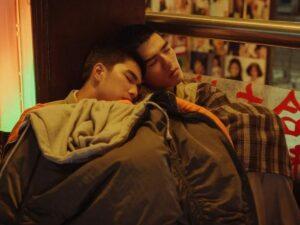I first discovered Your Name Engraved Herein through its theme song, “刻在我心底的名字” (“Your Name Engraved Herein”), on Spotify. As a long-time fan of Chinese music, I’ve always admired its ability to convey profound emotions through heart-rending lyrics and haunting melodies. And this song is no exception. A year has passed, but the song remains on loop in my playlist. This connection with the music led me to explore the film behind it.
Starring Edward Chen and Tseng Jing-Hua, Your Name Engraved Herein is Taiwan’s highest-grossing LGBTQ+ movie. It became the first LGBTQ-themed film to break the NT$100 million mark at the Taiwanese B.O. The film received five Golden Horse Award nominations, ultimately winning Best Cinematography and Best Original Film Song.
WATCH: 10 Greatest Yasujiro Ozu Movies, Ranked
Love in the Shadows
Set in 1987 Taiwan, as the country emerges from martial law, the film follows Chang Jia Han (Edward Chen) and Wang Po Te, also known as Birdy (Tseng Jing-Hua). The two male students, at an all-boys Catholic high school, navigate their burgeoning feelings for each other in a society still steeped in homophobia. Though their love is never explicitly declared, their interactions—filled with lingering glances and subtle, charged exchanges—beautifully capture their blossoming romance. Director Kuang-Hui Liu’s film creates a palpable emotional connection with the viewer that transcends the screen.
While the end of martial law was a turning point in Taiwan’s politics, it did little to change public attitudes toward homosexuality. Homophobia remained rampant; gay students were often called “queer”, and subjected to verbal and physical abuse. The film poignantly captures this stigma, showing how homosexuality was viewed as a mental illness. Despite Taiwan’s socio-political progress at the time, the deeply rooted prejudice meant that LGBTQ+ individuals were still isolated and discriminated against.
Birdy’s struggle to embrace his true self sees him succumbing to societal expectations and their heteronormative standards. When co-education is introduced at their school, he starts a relationship with a female bandmate. Birdy later marries her and has a child, but their eventual divorce reflects the inner turmoil and emotional strain of suppressing his true identity.
Silenced By Fear
I’ve read countless comments and reviews lauding the film’s execution, with many confessing they’re unable to shake off the emotional weight of the story, and remain deeply connected to the characters’ struggles. For the weak-hearted, I’d say keep a box of tissues handy. I found myself eagerly waiting for the theme song to accompany a scene, and when it finally did, it only took seconds for me to tear up.
The standout moment for me was the phone call between Jia Han and Birdy. Time has distanced them, but when they reconnect, the sporadic silence between them masterfully captures their deep-seated longing and shared pain. Unable to confront their past directly, they resort to polite inquiries about each other’s lives, sidestepping the unspoken. But when Jia Han plays the theme song over the phone, the emotional barrier crumbles and both are moved to tears. Tears that encapsulate the complexity of their shared history. The moment feels raw and profoundly heart-breaking; the haunting melody and lyrics express all the unspoken words they’re too broken to utter.
Love Unrequited
While the film is undoubtedly a tearjerker, resonating deeply with its audience and shedding light on the harsh political climate of the time, I believe there’s room for an even stronger connection. The story focuses on two young men facing societal challenges as homosexuals, but much of the narrative is told through Jia Han’s perspective. His viewpoint dominates, especially in his private conversations with Father Oliver—the school’s priest and band leader—which offer intimate insights into his inner conflict as he grapples with questions about love and how homosexual and heterosexual love differ.
Jia Han shoulders much of the emotional weight of the relationship, relentlessly pursuing Birdy while agonising over the latter’s apparent indifference. This dynamic creates a sense of unrequited love rather than a shared journey where the audience can connect with both characters and their struggles. While Birdy’s ostensible detachment may be his way of coping, we are given only fleeting insights into his inner world, making it more difficult to fully understand his point of view. Greater depth and nuance in exploring Birdy’s internal struggles, especially the vulnerabilities he keeps concealed from Jia Han, would have significantly enhanced the film’s emotional resonance with the audience.
Wrapping Up
Nonetheless, as I write this review, the theme song continues to play in the background — perhaps a testament to my own inextricable connection with the film. It allows me to delve deeply into the characters’ tribulations and consider the pervasive impact of societal prejudice. Regardless of whether one has lived through similar experiences, the film’s exploration of love, loss, and identity evokes a universal sense of empathy for those curtailed by cultural or personal constraints, rendering it an evocative and deeply moving cinematic experience.
Rating: 4/5
Where to Watch: Netflix

